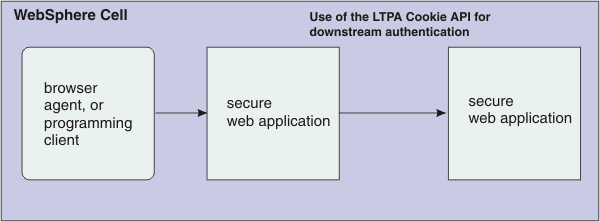Use a WebSphere Application Server API to achieve downstream web single sign-on with an LtpaToken2 cookie
We can programmatically perform downstream Single Sign On (SSO) web propagation of a LTPA cookie without the need for an application to store and send user credentials. WebSphere Application Server provides API support to propagate an LtpaToken2 cookie to downstream web single sign-on applications. Web applications running in mid-tier WebSphere servers might need to propagate LtpaToken2 cookies on downstream web invocations. In WAS v9, a new API is provided for application developers to programmatically perform downstream SSO without the need for an application to store and send user credentials.

This function is a public API in package...
-
com.ibm.websphere.security.WSSecurityHelper
...and is defined as follows...
/** * Extract an LTPA sso token from the subject of current * thread and builds a ltpa cookie out of it for use on * downstream web invocations. * When the returned value is not null use Cookie methods * getName() and getValue() to set the Cookie header * on an http request with header value of * Cookie.getName()=Cookie.getValue() * * @return an object of type javax.servlet.http.Cookie. * */
Example of how we can use the new WSSecurityHelper API:
import javax.servlet.http.Cookie; import com.ibm.websphere.security.WSSecurityHelper; Cookie ltpaCookie = WSSecurityHelper.getLTPACookieFromSSOToken()
 Deprecated feature: The getLTPACookieFromSSOToken() method from the
WSSecurityHelper class is deprecated. Use the functionality provided
by the getSSOCookieFromSSOToken() method from the WebSecurityHelper
class.depfeat
Deprecated feature: The getLTPACookieFromSSOToken() method from the
WSSecurityHelper class is deprecated. Use the functionality provided
by the getSSOCookieFromSSOToken() method from the WebSecurityHelper
class.depfeat
Subsequently, the LTPA cookie can be set on an HTTP request header. In this case, the value of the cookie header is the string:
- ltpaCookie.getName()=ltpaCookie.getValue()
For example, if we use org.apache.commons.httpclient.HttpMethod to build the HTTP request, the LTPA cookie can be set as follows:
HttpMethod method = .; // new your HttpMethod based on the
// target URL for the web application
if (ltpaCookie != null)
method.setRequestHeader("Cookie", ltpaCookie.getName()+"="+ltpaCookie.getValue());
We should only send LTPA cookies over SSL connections.
We must check whether the LTPA cookie returned from calling WSSecurityHelper.getLTPACookieFromSSOToken() in the previous example is not null before we issue any getter methods. Also, to successfully retrieve a LTPA cookie object, and to ensure an SSO token on the thread of execution, make sure that the user has established a successful authentication with the mid-tier server.
WebSphere Application Server does not ship supporting jars for HTTP programming, such as the Apache httpclient. Provide our own supporting functions for HTTP programming.
Related: